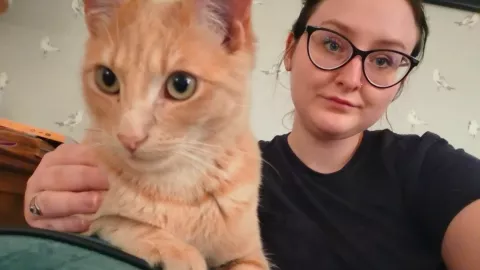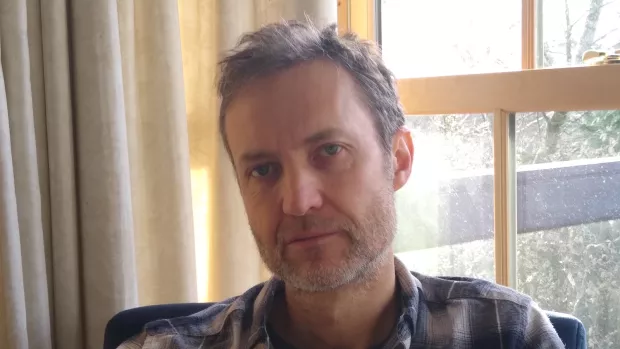
Finding the little sparks of joy
Clare lives with relapsing MS. She talks about experiencing her first MS relapse, and how she found humour to be the best medicine.
"You can feel when the poo comes out?"
"No. I can’t feel when the poo comes out."
I was 27. This is not a conversation I had imagined happening as a 27 year old.
I was having this unexpected exchange as a result of being in the midst of my first ever full MS relapse. I can’t remember if I knew at this point that I had MS, the timescale is all muddled. But I do know that when the doctor left I couldn’t help but laugh at the absurdity of it.
MS symptoms and numbness
Initially, I’d tried to skirt around the issue - I was having bowel issues and was verging on being incontinent. But I had told one of the lovely nurses, quite sheepishly, that “It’s sometimes hard to feel what’s going on... Y’ know. Down there.”
That was an understatement. I was completely numb from below my chest. Earlier that day I had laid down on my side for some time, confused as to why the lady in the bed beside me was giving me strange looks. Until I realised about an hour later that my underwear had been on show for god knows how long. I couldn’t feel that my pyjama bottoms were practically half way down my thighs, and that the whole ward was lucky enough to get a view of my granny pants.
Despite being a little embarrassed, I allowed myself another chuckle as I rearranged myself.
“You look like a 90 year old”
A couple of days later, my parents and my partner came to visit me in hospital. Due to the ongoing COVID-19 pandemic, they weren’t allowed in the ward. This meant that my poor partner had to use one of those rattling, prehistoric, hospital wheelchairs to wheel me down to the patch of grass outside the hospital, where my parents were waiting with a picnic.
I looked dreadful. I looked pasty and tired thanks to the relentless beeping of the heart and blood pressure monitors, and I had a cannula sticking out of my hand. I was also wearing ill-fitting pyjamas that I’d hastily flung into a bag before making my way to the hospital, and it was my first time in a wheelchair.
It’s pretty safe to say that my parents were a little shocked. I felt self conscious, unwell and scared. Despite the sweet treats and fizzy drinks my dad had brought, the mood was sombre. Until I heard my teenage sister giggle mischievously.
“You look like a 90 year old”.
My mum gasped, horrified. “Don’t say that!”
My smirking sister and I made eye contact, and before we knew it, I was laughing along with her. From that point, what would have otherwise been a pretty grim family gathering next to a hospital car park suddenly became a lot less bleak.
Humour can be therapeutic
Thankfully, I made enough of a recovery from my relapse to forgo the wheelchair. I do, however, need to use a stick when I walk. I have to place my cane in front of me and position my legs far apart from each other so that I can balance myself. At this point I am essentially a sentient tripod with the leg function of an inebriated penguin. And you know what? Sometimes that can be pretty funny.
Now, I’m not saying that it’s appropriate for people to laugh at the struggles of those who become unwell or use mobility aids. What I am saying, is that laughing along with people when they manage to find the humour in their own situations can be therapeutic.
"Why are your friends saying get well soon if you’re terminally ill?", my little sister asked me once. Through gasps of laughter, I informed her of the difference between a chronic illness and a terminal one. It’s a funny anecdote I love to tell people, and I like to think it makes people feel a little more at ease when approaching the topic of my MS- After all, you can’t really mess up worse than that!
Finding the little sparks of joy
Shortly after this silly little exchange, I visited my parents’ house, only to find my sister’s friends giggling and trying to do wheelies in my wheelchair. As I walked (or rather, hobbled) through the door, the kids scrambled to their feet, looking guilty and mumbling apologies. I smiled.
“Go on then. Show everyone what you can do with that chair.”
So, yes. I am hereby giving you explicit permission to take my wheelchair for a spin. Laugh with me when I fall over or get my words muddled. Help me find the little sparks of joy in this otherwise pretty joyless condition. After all, laughter really is the best medicine.




